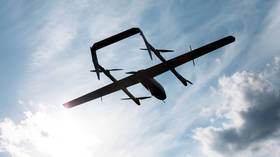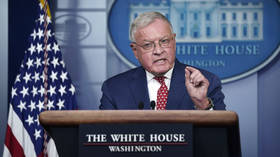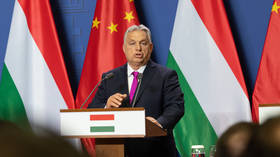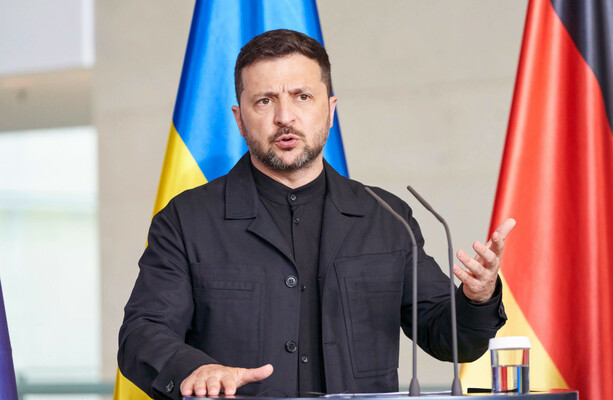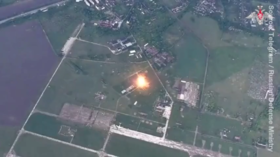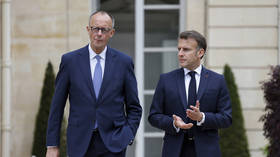Western Europe has lost the plot – but still plays with fire
Macron speaks, Merz contradicts, and the EU drifts into irrelevance
By Timofey Bordachev, Program Director of the Valdai Club
German Chancellor Friedrich Merz, left, walks with French President Emmanuel Macron. © Ludovic Marin / Pool via AP
Modern Western Europe is quickly becoming a real-world demonstration of Hegel’s famous dictum – that history repeats itself, first as tragedy, then as farce. In the past, the missteps of its leaders could be seen as awkward but forgivable moments against the backdrop of a still-coherent West. Today, farce is becoming the default operating mode for the region’s political elite.
Whether the antics come from small states like Estonia or from former heavyweights like Germany, France, and Britain, the effect is the same: Europe, or more precisely the European Union and its close NATO-aligned partners in the West, is no longer behaving like a serious geopolitical actor. What was once merely weakness has become a lifestyle – a self-parodying style of politics defined by empty declarations, theatrical gestures, and media spectacle.
The reasons are not difficult to identify. Western Europe has lost its strategic compass. What we’re witnessing now, unfolding near Russia’s borders, is a crisis of direction with no clear destination. Recent developments, in fact, would have seemed unimaginable even a few years ago.
In the space of just a few weeks, the leaders of the EU’s most prominent countries issued ultimatums to Russia – with no thought as to what they might do if Moscow ignored them. Unsurprisingly, the efforts of the four most vocal backers of Ukraine – Britain, Germany, France, and Poland – collapsed into rhetorical theater with no follow-through.
Estonia, never one to miss a moment for posturing, saw a group of its sailors attempt to seize a foreign ship en route to St. Petersburg. The move, swiftly rebuffed by the Russian military, triggered a political scandal back in Tallinn – though perhaps not the kind they’d hoped for.
In Paris, President Emmanuel Macron continues to rely on dramatic pronouncements to remain in the spotlight. In Berlin, newly appointed Chancellor Friedrich Merz declared that Ukrainian forces were permitted to strike Russian cities with Western missiles – only to be contradicted hours later by his own finance minister. As for the long-touted
“peacekeeper deployment plan” pushed by Paris and London, European media finally admitted what had been obvious for months: the plan is dead, lacking support from Washington.
Some of this, admittedly, stems from a media environment that has grown dangerously overheated. Western news outlets now thrive on alarmism, churning out a steady stream of war talk and pushing politicians to match the rhetoric. Since the launch of Russia’s military operation in Ukraine, media across the Atlantic and in Brussels have played the role of propagandist, not watchdog.
But the problem runs deeper than headlines. Europe’s political class has drifted into a world of abstraction, where politics has become an intellectual game – untethered from real capabilities or consequences. In some cases, the farce is provincial, as with Estonia’s attempted maritime stunt. In others, it is cloaked in academic posturing, such as the wordy performances Macron delivers with the help of philosophically literate aides.
In all cases, one truth emerges: the European Union and its near partners are no longer serious actors in world affairs. They are still loud, still self-important, but no longer decisive. Their actions do not shift the global balance. The only real questions now are how long this detachment from reality can persist, and what the next stage of decline will look like.
This is not a matter of personalities or party lines. Whether globalist liberals or national conservatives take charge in Europe, the result is increasingly similar. Right-wing governments that replace the establishment often prove just as erratic and symbolic in their behavior.
What makes this transformation even more surreal is that Europe still has the ability to turn its politics into a spectacle. Many of its politicians – or at least their speechwriters – are highly educated. Macron’s speeches, rich in historical and philosophical references, are products of minds trained at the best institutions. Once, such intelligence was used to shape policy and outplay rivals like Russia. Now, it produces only clever phrasing for empty statements
Macron, of course, helped set the tone when he declared NATO
“brain dead” back in 2019 – a remark that was amusing at the time. But after the laughter faded, Western Europe began churning out similarly dramatic slogans, each more detached than the last. The British followed suit. Now the Germans are joining the script.
More troubling than the words, though, is the lack of accountability for them. European leaders say much and do little – and when they do act, it is often misguided. Worse, they seem genuinely unaware of how their provocations are perceived outside their own echo chamber. What looks absurd in Moscow, Beijing, or even some quarters of Washington, is seen in Brussels or Berlin as noble posturing. These leaders are living in a different dimension, but the rest of us still have to engage with their declarations, however disconnected from reality.
And while it is tempting to dismiss this as just another European drama, the risks are real. Britain and France still possess nuclear capabilities. The EU’s economy, while faltering, retains global influence. Even the smallest states – like Estonia – can trigger crises that draw in larger powers. The Baltic naval stunt may have been primitive theater, but under the wrong conditions, even small acts of political play-acting can spiral into genuine danger.
No one seriously believes the United States is prepared to defend its European satellites at the cost of war with Russia. But given the destructive power of both Russian and American arsenals, even the faintest chance of escalation must be treated seriously – even if Western Europe itself has lost the ability to understand the consequences of its actions.
Ironically, Poland – once one of the most loudly anti-Russian voices in Europe – now appears almost restrained compared to the behavior of France, Germany, or Britain. In recent years, Warsaw has moved toward a more conservative, if still adversarial, stance – offering a rare glimpse of something resembling balance.
In the last century, Western Europe unleashed two of the most devastating wars in human history. Today, it plays at war once again – but with less awareness, less responsibility, and far less capacity. The danger lies not in its strength, but in its delusions. This is not Liechtenstein brandishing a sabre. These are nations with real armies, real missiles, and an increasingly fragile grasp on reality.
If there is to be stability in Europe’s future, it must start with accepting the truth of the present. The continent is no longer the center of world politics. The logical next step is to strip Western Europe of the destructive capabilities it no longer knows how to wield. Demilitarization is not humiliation. It is realism – and the only way to bring Europe’s role back in line with its actual relevance.
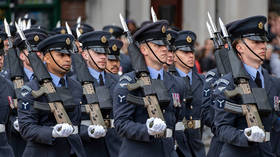 READ MORE: UK to dramatically increase weapons production
READ MORE: UK to dramatically increase weapons production
